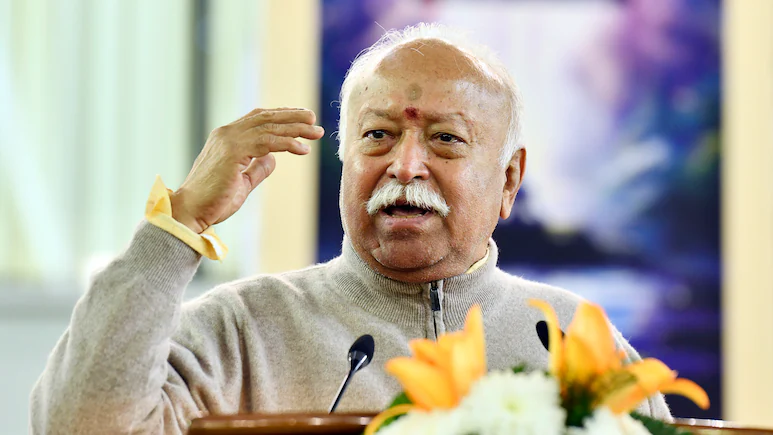Mohan Bhagwat's Remarks Spark Outrage Among Hindu Sheer
Burocrazy Exclusive
Mohan Bhagwat, delivering a lecture in Pune, advocated for an "inclusive society."
News in Brief
New Delhi/Pune: RSS Chief Mohan Bhagwat’s remarks on temple-mosque disputes have sparked a backlash from Hindu saints and priests. Speaking in Pune, Bhagwat discouraged using religious conflicts for leadership gains, urging harmony post-Ayodhya Ram Temple’s construction. His comments drew criticism from prominent seers like Swami Rambhadracharya, who asserted, “Bhagwat is not our disciplinarian.” The Akhil Bharatiya Sant Samiti echoed this, emphasizing religious matters should remain under dharmacharyas’ guidance. Critics argue Bhagwat overstepped cultural boundaries, while supporters view his stance as fostering unity. The debate underscores tensions between religious and cultural leadership in shaping India’s socio-political landscape.
New Delhi/Pune: In a recent turn of events, Mohan Bhagwat, the chief of the Rashtriya Swayamsevak Sangh (RSS), has found himself at the center of a heated controversy following his remarks on temple-mosque disputes. Known for his influential position within one of India's largest Hindu nationalist organizations, Bhagwat's comments have not only stirred political debates but have also led to a significant backlash from the very custodians of Hindu religion - the saints and priests.
Bhagwat, addressing an event in Pune, expressed his concern over the rising tide of disputes between temples and mosques post the construction of the Ram Temple in Ayodhya. He cautioned against individuals attempting to gain political or religious leadership by stirring up such controversies, stating, "After the construction of Ram Mandir, some people think by raising such controversies, they will become leaders of Hindus. This is not acceptable." His comments aimed at promoting harmony and discouraging religious discord did not sit well with many in the Hindu religious community.
Prominent Hindu seers, including Jagadguru Swami Rambhadracharya and Shankaracharya Swami Avimukteshwarananda, have publicly criticized Bhagwat for overstepping his bounds. Swami Rambhadracharya, in particular, went on to assert, "Mohan Bhagwat is not our disciplinarian; we are." This statement underscores the belief among some Hindu leaders that religious matters should be left to religious scholars and not to heads of cultural organizations like the RSS. The Akhil Bharatiya Sant Samiti (AKSS), an organization of Hindu saints, echoed this sentiment, emphasizing that dharmacharyas (religious gurus) are the ones who should guide religious practices and not political or cultural leaders.
The controversy has been amplified by posts on X and related trends, where discussions have ranged from support to outright criticism of Bhagwat's stance. Some users on X even suggested that the RSS chief was trying to moderate Hindutva, a move seen by traditionalists as a dilution of their cultural identity. The trending topics on X have highlighted a divide, with some seeing Bhagwat's comments as a step towards communal harmony, while others perceive it as an unnecessary interference in religious affairs.
Critics argue that Bhagwat's role should be confined to cultural and societal upliftment as per the RSS's foundational principles, not in deciding or dictating religious matters. They point out that the RSS's involvement in religious disputes could blur the lines between religion and politics, potentially leading to further division rather than unity. On the other hand, supporters of Bhagwat's remarks see them as an attempt to foster a more inclusive Hindu identity, one that does not fuel constant conflict over religious sites.
This incident has sparked a broader debate about the roles of religious versus cultural leaders in modern India. It raises questions about who has the authority to speak on matters of faith, especially when such discussions have significant socio-political implications. The backlash against Bhagwat from saints and priests highlights the tension between the RSS's vision of a unified Hindu society and the traditional custodians of Hindu religion who maintain that spiritual guidance should remain apolitical.
As this debate unfolds, it becomes clear that the intersection of religion, culture, and politics in India continues to be a complex and sensitive arena. Bhagwat's remarks have not only questioned the dynamics of leadership within Hindu society but have also reignited discussions on what it means to be a leader in today's India, where every word can either unite or divide.
Advertise with US
Advertise with US









